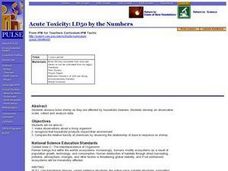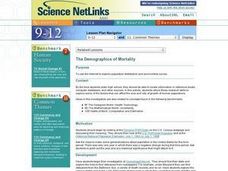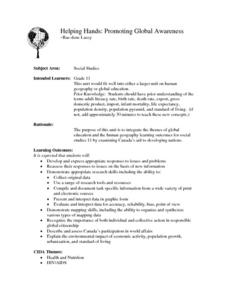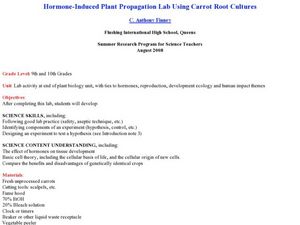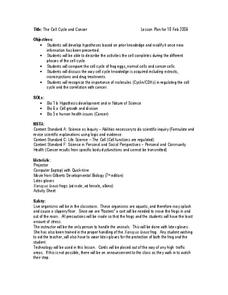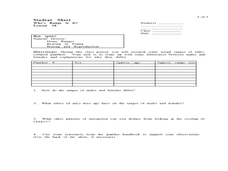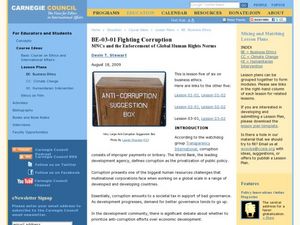Curated OER
Location of Cities 201
Pupils work in pairs to locate the ancient cities on a world atlas using the longitude and latitude measurements. They examine the physical and human futures that explain their locations.
Curated OER
Acute Toxicity: LD50 by the Numbers
Students observe brine shrimp as they are affected by household cleaners, develop observation scale, collect and analyze data, and discuss how household products and pesticides negatively impact environment.
Curated OER
Health and the Community
Students illustrate cause and effect of pollution to human health through the analysis of an image from the American Industrial Era. They investigate how industry affected rest of the community or city.
Curated OER
Canada's Natural Regions and Their Varied Characteristics
Pupils study Canada's six natural regions, including both the human and economic activities of each. In groups, they create a display representing one of the six regions.
Curated OER
The Demographics of Mortality
Students view the Dynamic POPClocks on the U.S. Census webpage and discuss their meaning. They explore age-related death rates of the human population and collect information about the deaths of humans and organize them into a life table.
Curated OER
Cells and Cancer
Students idenitfy that cancer is a growth of mutated cells and that cancer cells are only one type of cell that causes disease in our body. They also identify that all eukaryotic cells contain a nucleus, cytoskeleton, and a cell...
Curated OER
Yeast Cells and Their Environment
Students create their own experiment in which they have yeast cells growing in liquid environments. They examine the relationship between humans and microorganisms. They also practice using the scientific method.
Curated OER
Helping Hands: Promoting Gloval Awareness
Eleventh graders explore Canadian support for foreign aide. In groups, 11th graders discuss Canadian aide policies and express their opinion of each. Students brainstorm methods of contributing to developing nations. They complete...
Curated OER
Immigration Push and Pull Factors
Eighth graders examine significant ideas, beliefs, and themes; organize patterns and events; and analyze how individuals and societies have changed over time in Maryland, the United States, and the world.
Curated OER
Hormone-Induced Plant Propagation Lab using Carrot Root Cultures
Learners evaluate the importance of hormones in living things. For this biology lesson, students experiment on carrots to differentiate how humans and plants reproduce. They collect data from experiment to answer analysis questions.
Curated OER
Save Our Soil
Students explore the need for good farm land and reasons for the disappearance of agricultural areas. They brainstorm environmental friendly decisions and soil conservation. In their community, students explore new land developments...
Curated OER
The Cell Cycle and Cancer
Students compare and contrast the cell cycle of frog eggs, normal cells, and cancer cells. They watch a video about early development of the frog embryo, generate a hypothesis in small groups, and listen to a teacher-led lecture. ...
Curated OER
Pulse
Students determine a baseline pulse rate then chart the changes in rate with exercise. They describe the changes and develop a rationale for their observations. The task assesses students' abilities to make simple observations, determine...
Curated OER
Haniwa
High schoolers use non-fired clay and posterboards to create and display examples of Haniwa and kofun in this exciting instructional activity for the Social Studies, Humanities, Asian Studies, or Art classroom.
Curated OER
Insect Biology and Ecology: A Primer
Students explore insects and closely related organisms. They examine the growth and development of a lady beetle. Students classify insects and organize them. They investigate pest management.
Curated OER
Air Pollution: A Local and Global Problem
Students work together to solve the problem of air pollution. Using the Internet, they research the pollution problem in one city. Using the data, they develop their own solution and pitch it to the class. They must identify the...
Curated OER
Cartographer and Journalish as Storytellers
Students collaborate in groups of four students to create a written description of their community during a specific year. They analyze data provided by maps and newspaper articles. They meet as a whole class to discuss their conclusions.
Curated OER
Mythical Animals
Students create imaginary animals by assembling pictures of body parts from pictures of real animals. This is one of three linked tasks. The others are "Who's Parts Do I Have?" and "Animals Piece by Piece."
Curated OER
What Can I Do?
Students examine their feelings and study constructive ways for resolving conflict. For this feelings and conflict resolution lesson, students learn how to communicate their inner feelings. They complete a worksheet and work on a web...
Curated OER
Bacterial Transformation: Laboratory Experiment
Students participate in a group lab in which they complete the process of bacterial transformation. If lab procedures are followed correctly, Students see their results in a few days...bacteria glowing green.
Curated OER
Who's Range is it?
Students investigate the habits of panthers by analyzing radio transmitted data. In this animal life lesson, students utilize computers to view the range of different statistics dealing with Florida panthers. Students...
Curated OER
Bacterial Transformation
High schoolers discuss a bacterial experiment they previously performed and complete a pre-assessment. They participate in a lecture discussion given by the teacher through PowerPoint and then complete a cartoon worksheet and...
Curated OER
Fighting Corruption
Twelfth graders research the different types of business ethics. In this Economics lesson plan, 12th graders read various handouts on corruption. Students participate in a discussion on trying to end corruption.
Curated OER
Designing a Real Life Ecosystem!
Students research abiotic and biotic factors concerning the concept of an ecosystem. Record and analyze data collected. Write a lab report in proper and scientific format with thinking and analytical skills. Work as a cooperative team.

